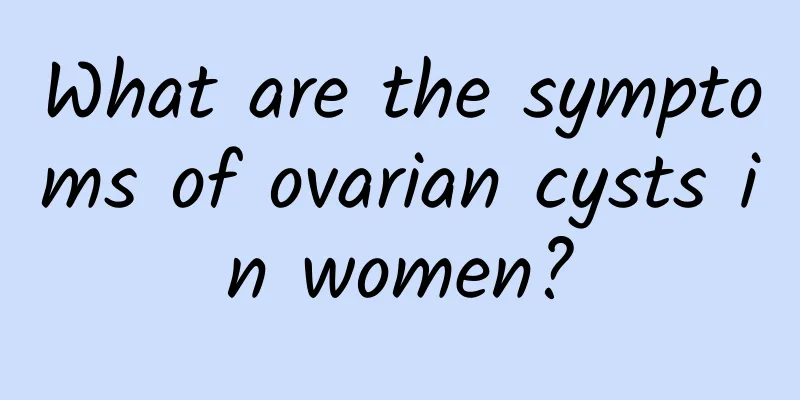What are the symptoms of uterine fibroids? Will uterine fibroids cause compression symptoms?

|
There are many kinds of gynecological diseases. Uterine fibroids are a common gynecological disease. People with this disease should not worry too much. As long as they actively treat it, they can control the disease well. To treat the disease, you must first understand the symptoms of the disease and do not miss the best treatment time. What are the symptoms of uterine fibroids? Increased vaginal discharge: Intramural fibroids increase the area of the uterine cavity, increase endometrial secretions, and are accompanied by pelvic congestion, leading to increased vaginal discharge; once submucosal fibroids are infected, there may be a large amount of purulent vaginal discharge. If the fibroids ulcerate, necrotize, or bleed, there may be bloody or purulent vaginal discharge with a foul odor. Lower abdominal mass: When the fibroids are small, the mass cannot be felt in the abdomen. When the fibroids gradually increase in size, the uterus can be touched from the abdomen to feel a hard mass when the pregnancy is more than 3 months, which is more obvious when lying flat in the morning. What are the clinical manifestations of uterine fibroids? Huge submucosal fibroids can break away from the cervix and even the vagina, and the patient can break away from the mass due to the vulva. Compression symptoms: If the anterior uterine wall fibroids compress the bladder, it can cause frequent urination and urgency; cervical fibroids can cause dysuria and urinary retention; posterior uterine wall fibroids can cause lower abdominal swelling, discomfort, constipation and other symptoms. Broad ligament fibroids or giant cervical fibroids develop laterally, embed into the pelvic cavity, and compress the ureter, which can cause ureteral dilatation, hydronephrosis, and even one kidney without function. Abdominal pain, backache, and lower abdominal distension: Patients usually have no abdominal pain. When the pedicle of the subserosal fibroid is twisted, there will be acute abdominal pain. When the fibroid turns red, the abdominal pain will be severe and accompanied by fever. Don't worry too much about the disease. As long as you face the disease positively, you can cure the disease well. But as female friends, we must develop good living habits, avoid unclean sex life, and pay attention to menstrual hygiene to effectively prevent diseases. |
<<: What are the symptoms of uterine fibroids? Clinical manifestations of uterine fibroids
>>: What to do with mild uterine fibroids? Symptoms of mild uterine fibroids
Recommend
New topic of weight loss: African mango seed extract is actually...
Smiling Pharmacist Network has recently written a...
What are the classifications of multiple uterine fibroids? What is the best examination for multiple uterine fibroids?
Classification of multiple uterine fibroids origi...
How to prevent pelvic effusion in daily life
Pelvic effusion is a manifestation rather than a ...
How to treat the redness and swelling when fungal vaginitis recurs and causes itching, pain and redness?
How to treat the redness and swelling when fungal...
Patients with cervicitis should pay attention to their symptoms in time
Cervicitis is one of the common gynecological dis...
Can micro-exercise help you lose weight? 10 Housework Calorie Burning Tips
Who says that “exercise” means going to the gym? ...
Will uterine fibroids appear as lumps? How to take care of uterine fibroids?
Uterine fibroids are common in multiple uterine f...
Taipei Veterans General Hospital and Tai Tzu-ying’s alma mater, Taipei City University, are collaborating! Providing comprehensive medical care for athletes
Taipei Veterans General Hospital and Taipei City ...
Just 1 minute! Massage before bed to eliminate leg swelling
Many people suffer from swollen feet due to sitti...
How to check for bacterial vaginosis
Many women usually ignore the health of their pri...
Irregular menstruation in women can easily lead to uterine fibroids!
Is it clear to everyone that irregular menstruati...
What foods are good for pelvic inflammatory disease
Is pelvic inflammatory disease common in daily li...
How to diagnose acute and chronic pelvic inflammatory disease?
Chronic pelvic inflammatory disease and endometri...
[Line Goes Viral] Hot bitter melon only kills cancer cells and saves you for life! Nutritionist: The devil is hiding here...
Recently, an article titled "Hot bitter melo...
Diet after chocolate cyst surgery
After the operation of chocolate cyst, you should...









